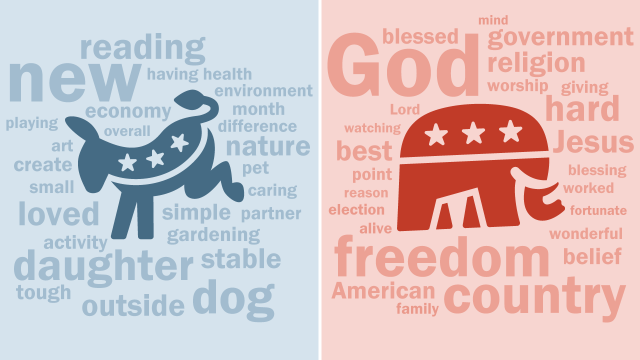Student Perspective: Are Friendships Across the Aisle Possible?

Courtesy of Pew Research Center
By Anthony Curioso
Whether on the national level or the comparatively small scale of the CUA campus community, there has been considerable debate over whether differences in political affiliation are a death sentence to one’s friendships. A 2020 article from National Public Radio (NPR) detailed some people’s extreme measures to avoid or ostracize family members and friends with different political views.
The current President of the United States, Joe Biden, is a proud Democrat and has been so for decades. Yet, he maintained a close friendship with longtime Republican Senator John McCain of Arizona until McCain’s passing. Biden famously spoke at McCain’s funeral in a last act of friendship. This stands in contrast to what seems like the norm today.
But bipartisan collaboration at the highest level is not an antiquated concept. Though she was ultimately unsuccessful in her bid for President in the 2024 United States federal election, now-Vice President Kamala Harris, a Democrat from California, promised that as President, she planned to appoint a “bipartisan council of advisors” to provide feedback on some policy decisions.
I consider myself a Democrat with views on specific national issues that differ from those of fellow Democrats. However, I have many friends at CUA who affiliate with either party. I find it easier than most to have conversations with people about issues on which we may disagree. Some of my closest friends have served on the e-boards of the College Democrats, College Republicans, Tocqueville Society, and Young Americans for Freedom (YAF) chapters at CUA.
I’ve had extremely fruitful conversations with friends across these e-boards about my views on various topics. When I see one of these groups tabling in the Pryzbyla Center for their respective events I engage with their perspective, from abortion to immigration to the unrest in the Middle East.
I distinctly remember attending an event hosted by YAF during my freshman year. It was a panel on immigration policy. I attended because I wanted to learn about the perspectives of the individual panelists about each question that was posed to them. This is one example of the strong bipartisan dialogue I find present in our campus.
It is now more imperative than ever that we have fruitful and respectful conversations to understand people who have different views from our own. CUA’s non-partisan Alexander Hamilton Society chapter exemplified this by hosting a debate two weeks ago. Students representing a variety of the political clubs on campus decorously voiced their opinions on “policy, presidential candidates, and events over the past four years.”
Furthermore, refusing to build bridges with someone because of their politics may lose you a fresh connection.
It is important to have honest and respectful conversation with the person you disagree with to learn about their perspectives.







